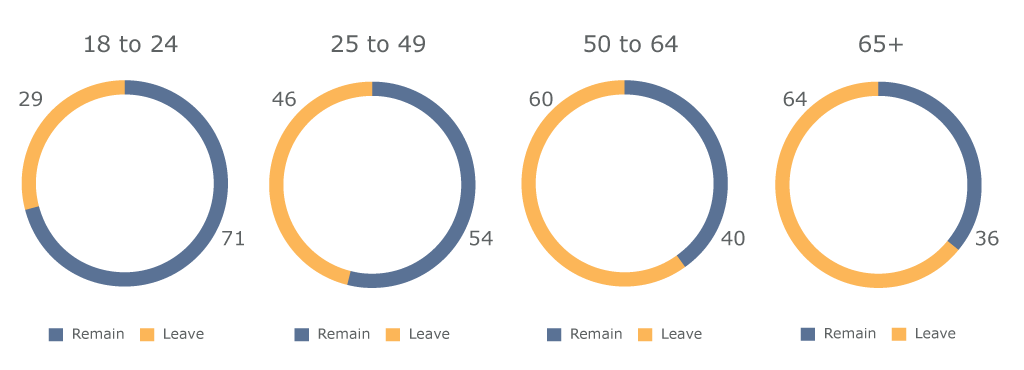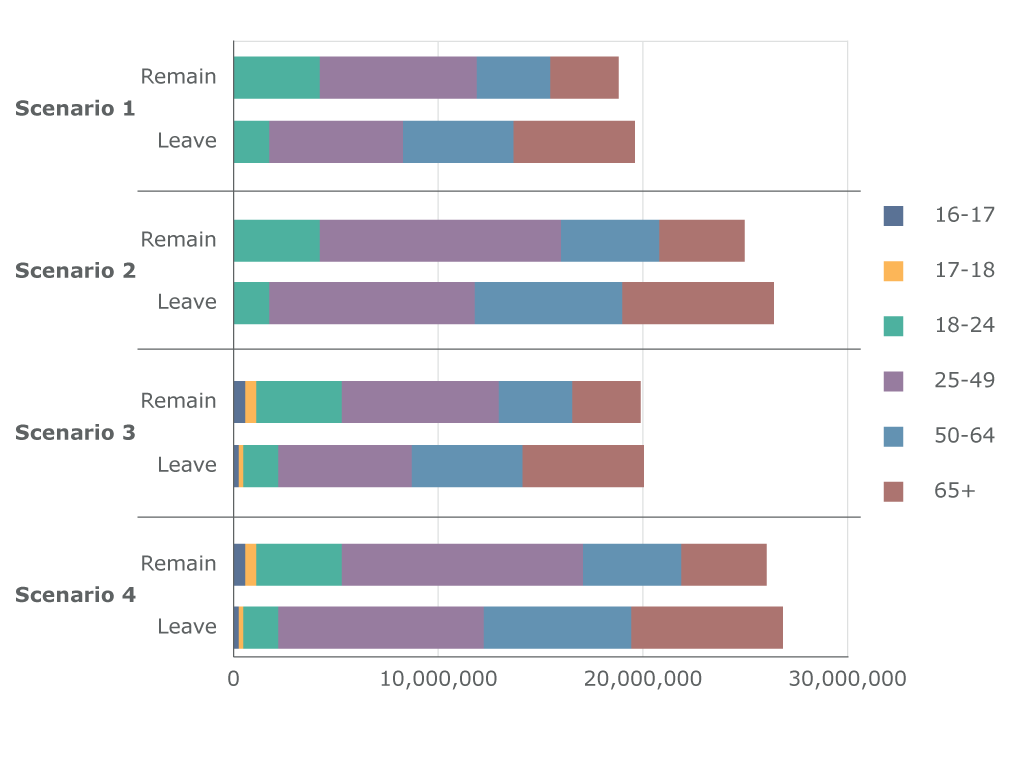by Harald Wilkoszewski
Britain’s generational divide was one of the first stories to come out of the UK’s historic referendum to leave the European Union. Within hours, news that more than two-thirds of voting 18 to 24-year-olds had cast their ballot in favour of staying in the EU rippled through the mediosphere, instantly igniting debates on generational privilege and responsibility.
On the one hand, it’s been argued, the preferences of young people have been unfairly trampled by the fears of their parents and grandparents. On the other, the result of the referendum was justified considering young people’s embarrassingly low estimated turnout—just 36%. So could have the young changed the outcome of the referendum had their voter turnout been higher?
The numbers say: no. If we dig a little deeper, we see it indeed is demographics—not turnout—that makes the difference. What’s more: even lowering the voting age to 16 would not have made a change.
Let’s crunch the numbers.
As the dust settled over the days after the referendum, YouGov consolidated their estimates of how various age groups voted in the EU referendum. It largely confirms the first rough estimates: the old wanted out, the young to stay in (Figure 1).

Sky Data estimates for voter turnout in the referendum show an age pattern that is fairly close to the ones we observed during the 2015 general election in the UK: about 65% for 25 to 49-year-olds, 75% for 50 to 64-year-olds, and about 80% for voters over 65. If we combine these with the latest population estimates from the UK’s three statistical offices (England & Wales, Scotland, and Northern Ireland), we see that–in contrast to the arguments we have read over the past two weeks–even if literally every young person had voted in the referendum, Vote Leave would have enjoyed an 880,000-vote advantage (Figure 2, Scenario 1).
By setting the voter turnout of each age group to 100%, i.e. assuming the entire electorate participates in the referendum, we can assess the pure impact of demography on voting outcomes. In this scenario Vote Leave would have won by an even higher margin, about 1.4 million votes (Figure 2, Scenario 2).

Figure 2: Voting results in EU referendum on 23 June 2016 by age groups (absolute numbers) for four scenarios of voter turnout.
Scenario 1: 100 % voter turnout for youngest age group 18-24, estimated real voter turnout for other age groups (25-49: 62 %, 50-64: 75 %, 65+: 80 %).
Scenario 2: 100 % voter turnout for all age groups.
Scenario 3: Like Scenario 1, but with lower voting age set to 16.
Scenario 4: Like Scenario 2, but with lower voting age set to 16.
Source: HW/Population Europe, based on offficial population data of the three statistical offices in the UK. Estimates for the electorate include all UK residents. Voter turnout estimates based on Sky Data and Ipsos MORI.
Some authors have argued that lowering the voting age to 16 (as e.g. in the Scottish independence referendum) would have flipped the result of the EU referendum. But also here the numbers tell a different story (Figure 2, Scenarios 3 and 4). Assuming that the 16- to 18-year-olds would have voted similarly to voters in the age group 18 to 24, the margins would have been smaller, but Vote Leave would have remained in the lead.
These numbers make one thing clear: that demographic ship has sailed. Population ageing has altered the UK’s demographic makeup so much that turning out 100% of the country’s young people to vote could not have made their majority preference count in a close race. And since population ageing has only just begun, it is likely that this cleavage will continue to deepen in the UK – and maybe also in other European countries.
The outcome of the EU referendum has therefore not only raised fundamental questions about the functioning of the European Union and the future of the United Kingdom as a country, it has also given us an unprecedented glimpse into the effects of population ageing on electoral politics and, ultimately, policy.
Policymakers must find a way to deal with the demographic deficits population ageing is imposing on our democracies. It will be undoubtedly a real puzzle, as simply lowering the voting age to 16 apparently wouldn’t be enough. In any case, Brexit has really shown that demography can no longer be overlooked.
About the author:
Harald Wilkoszewski, Head of Population Europe‘s Information Centre Berlin, Germany.